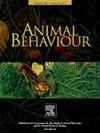Acute and vicarious effects of social defeat stress on social behaviour in California mice, Peromyscus californicus
IF 2.3
2区 生物学
Q2 BEHAVIORAL SCIENCES
引用次数: 0
Abstract
Agonistic social interactions are a significant source of stress across many species. Stress responses can have adverse effects on the brain and body, so avoiding stressful social situations can be advantageous. There is increasing evidence that, in social species, individuals can detect threatening social situations by observing others in their social group, a phenomenon referred to as social contagion. In this study, we tested the extent to which olfactory cues or physical interactions are used to transmit stressful states in California mice. We found that a single episode of social defeat reduced social approach and increased social vigilance in both male and female mice. This result is unlike previous studies that examined the long-term effects of social stress in California mice, in which the effects of stress on social behaviour were stronger in females. Neither volatile nor nonvolatile olfactory cues from stressed individuals were sufficient to alter the behaviour of familiar cagemates. In a second experiment on male California mice, we observed that mice that witnessed defeat and physically interacted with a defeated cagemate showed reduced approach to a novel empty cage. Effects were weaker in social contexts. These results suggest that, in California mice, more direct interactions with a stressed individual are required to induce social contagion effects. These results have important implications for how social defeat research is conducted and informs future studies to examine differences in activation of neural circuitry between males and females.
社会失败压力对加州小鼠社会行为的急性和替代性影响
激烈的社会互动是许多物种压力的重要来源。压力反应会对大脑和身体产生不利影响,所以避免有压力的社交场合是有益的。越来越多的证据表明,在群居物种中,个体可以通过观察其社会群体中的其他人来发现威胁的社会状况,这种现象被称为社会传染。在这项研究中,我们测试了嗅觉线索或身体相互作用在多大程度上被用来传递加州小鼠的压力状态。我们发现,在雄性和雌性小鼠中,一次社交失败会降低它们的社交方式,提高它们的社交警觉。这一结果不同于之前对加州老鼠社会压力的长期影响的研究,在加州老鼠中,压力对社会行为的影响在雌性老鼠中更强。来自压力个体的挥发性和非挥发性嗅觉线索都不足以改变熟悉同伴的行为。在对加州雄鼠进行的第二个实验中,我们观察到,目睹失败并与失败的笼子同伴进行身体互动的老鼠,对新的空笼子的接近程度降低。在社会环境中,效果较弱。这些结果表明,在加利福尼亚小鼠中,需要与压力个体更直接的互动来诱导社会传染效应。这些结果对如何进行社会失败研究具有重要意义,并为未来研究男性和女性之间神经回路激活差异提供了信息。
本文章由计算机程序翻译,如有差异,请以英文原文为准。
求助全文
约1分钟内获得全文
求助全文
来源期刊

Animal Behaviour
生物-动物学
CiteScore
4.60
自引率
8.00%
发文量
236
审稿时长
10.2 weeks
期刊介绍:
Growing interest in behavioural biology and the international reputation of Animal Behaviour prompted an expansion to monthly publication in 1989. Animal Behaviour continues to be the journal of choice for biologists, ethologists, psychologists, physiologists, and veterinarians with an interest in the subject.
 求助内容:
求助内容: 应助结果提醒方式:
应助结果提醒方式:


